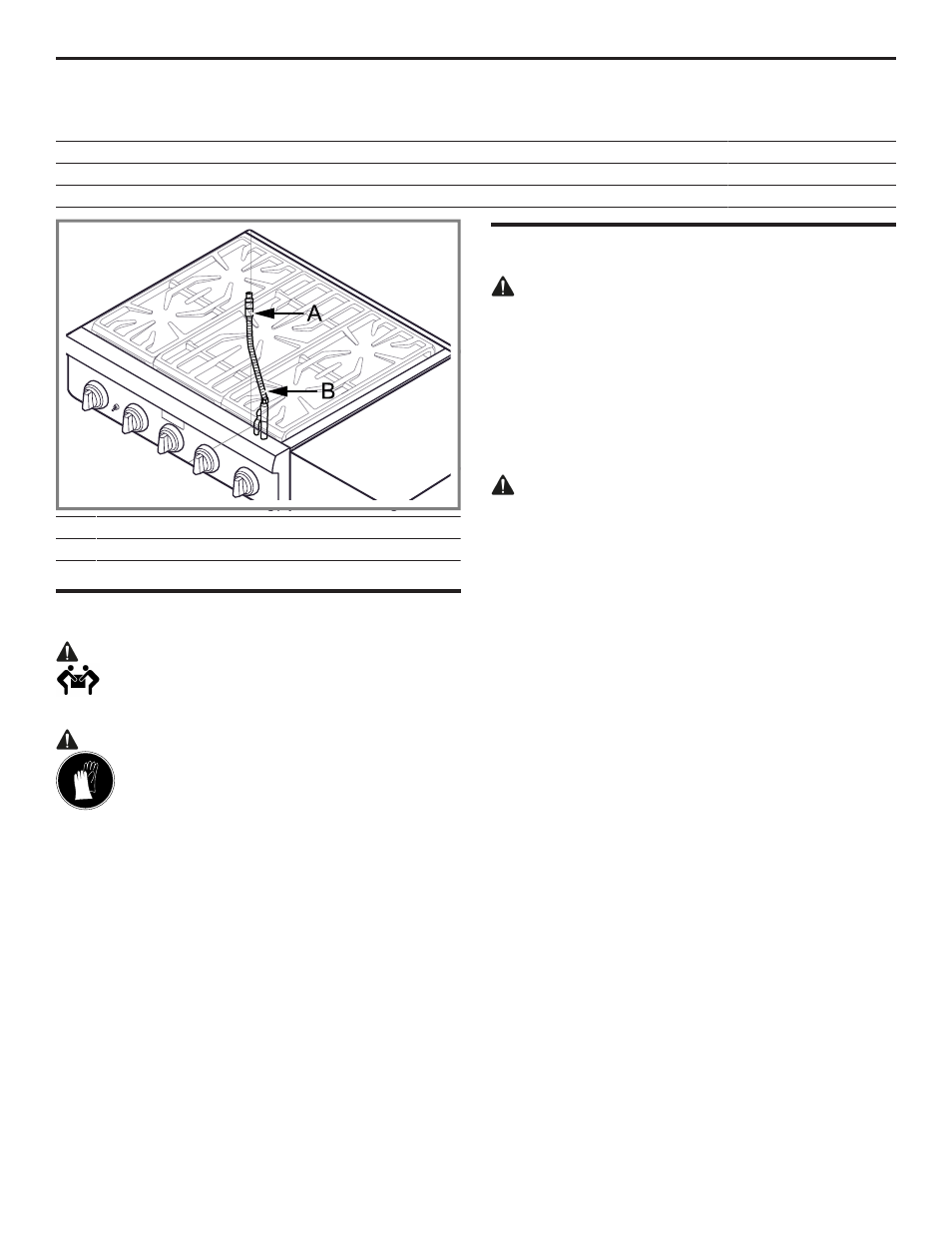5 gas inlet location, 6 unpacking the appliance, 1 removing the rangetop from the pallet – Thermador Professional Series Gas Rangetop Installation Instructions Manuel d'utilisation
Page 13: 7 gas requirements and connections, 1 high altitude installation

Gas inlet location
en-us
13
Gas inlet location
5 Gas inlet location
Gas inlet location
A manual valve must be installed external to the appliance, in an accessible location from the front, for the purpose of
shutting off the gas supply.
Gas inlet location
30"
36"
48"
From left side to centerline of gas inlet
63⅜" (152 mm)
11" (267 mm)
11" (267 mm)
From rear to centerline of gas inlet
2¼" (54 mm)
2¼" (54 mm)
2¼" (54 mm)
A
½" (12.7 mm) NTP
B
¾" (19 mm) flex line
Unpacking the appliance
6 Unpacking the appliance
Unpacking the appliance
WARNING
Unit is heavy and requires at least two people or
proper equipment to move and install.
WARNING
Hidden surfaces may have sharp edges.
▶
Use caution when reaching behind or under appliance.
6.1 Removing the rangetop from the pallet
1.
Remove the outer carton and packing material from the
shipping base. Ensure that you have all rangetop com-
ponents before proceeding.
2.
Remove the cooking grates, griddle plate, if applicable,
and burner caps to reduce the rangetop’s weight.
3.
Leave the protective film over brushed-metal surfaces,
to protect the finish from scratches, until the rangetop is
installed in its final position.
4.
Use a cross-head screwdriver to remove the screws
from the pallet brackets on the left and right sides of the
unit. Discard the screws and brackets after removal.
Gas requirements and connections
7 Gas requirements and connections
Gas requirements and connections
CAUTION
The appliance must be isolated from the gas supply piping
system by closing its individual manual shutoff valve dur-
ing any pressure testing of the gas supply piping system at
test pressures equal to or less than ½ psi (3.5 kPa).
When connecting unit to propane gas, make certain the
propane gas tank is equipped with its own high pressure
regulator in addition to the pressure regulator supplied
with the appliance. The pressure of the gas supplied to the
appliance regulator must not exceed 14" water column
(34.9 mbar).
WARNING
DO NOT use a flame of any kind to check for gas leaks.
¡
IMPORTANT: Do not ground to a gas pipe.
¡
IMPORTANT: If not already present, install a gas shut-
off valve in an easily accessible location. Make sure all
users know where and how to shut off the gas supply to
the appliance.
¡
Verify the type of gas being used at the installation site.
Make certain the range matches the type of gas avail-
able at this location.
¡
The appliance must be connected only to the type of
gas for which it is certified. If the appliance is to be con-
nected to propane gas, ensure that the propane gas
supply tank is equipped with its own high pressure regu-
lator in addition to the pressure regulator supplied with
the appliance.
¡
The gas supply connections shall be made by a compe-
tent technician and in accordance with local codes or
ordinances. In the absence of local codes, the installa-
tion must conform to the National Fuel Gas Code ANSI
Z223.1/NFPA54- current issue.
¡
A metal flex line or fixed metal pipe shall be used to
connect gas to the appliance. If a metal gas line cannot
be used, consult your local certified electrician or local
electric codes for proper grounding.
¡
A manual gas shut-off valve must be installed external
to the appliance, in a location accessible from the front,
for the purpose of shutting off the gas supply. The sup-
ply line must not interfere with the back of the unit.
¡
The installer should inform the owner of the location of
the gas shut-off valve. Make sure all users know where
and how to shut off the gas supply to the appliance.
7.1 High altitude installation
¡
This appliance has been tested for operation up to an
altitude of 10,100 ft (3,078 m) elevation above sea level.
¡
A high altitude kit is required for natural gas above
5,400 ft (1,646 m) elevation above sea level, and for
propane (LP) above 10,000 ft (3,048 m) elevation above
sea level.